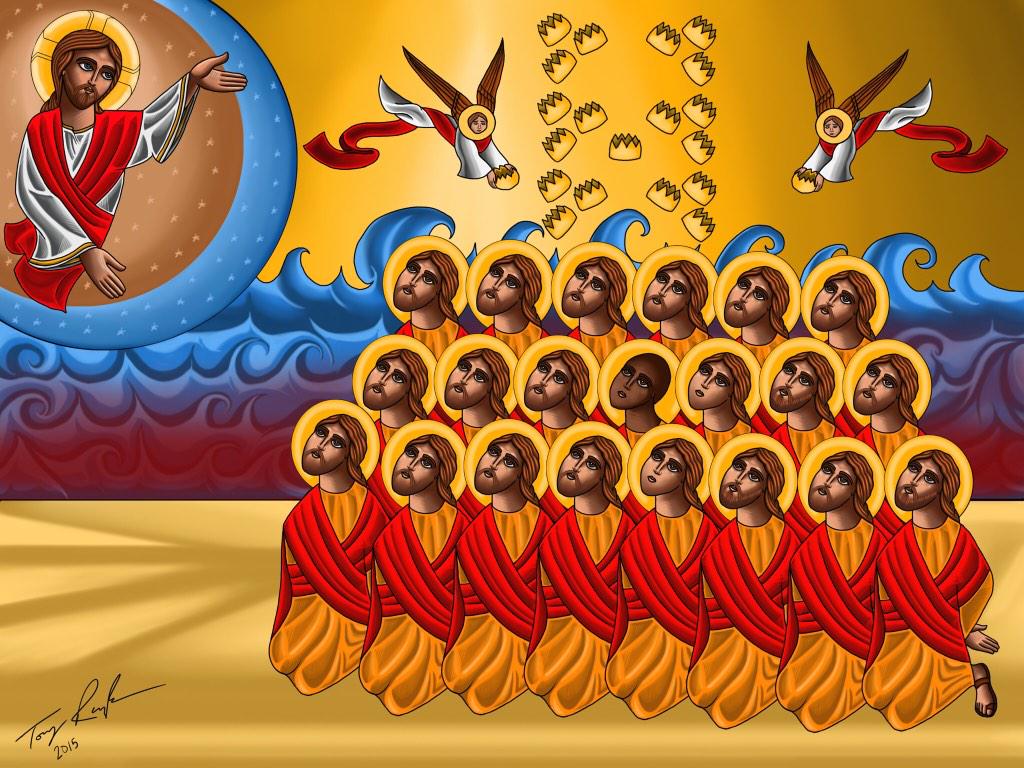This morning, as the dawn is breaking, my heart and mind and prayers are focussed on our friends in Egypt, the sisters ('tasooni') who are part of the Daughters of St. Mary Convent, Beni Souef (located in middle Egypt on the western bank of the River Nile). This is an order of Coptic Deaconesses in Egypt founded in 1965 by Metropolitian (Bishop) Athanasius who said, "We have to address social needs. Commitment to the poor is our
priority. We are committed to the most needy,
the marginalised". These include garbage collectors, the mentally
handicapped and abused women. The convent includes a refuge for women
facing personal hardship and severe marital problems - it is one of the
few women's shelters available in Egypt".
At least 30% of the population in Egypt live under the poverty line, and there is tremendous social and economic disadvantage, as well as political and religious challenges in the country and the region. In rural areas, people earn on average between $3 and $4 a day. “It’s a hard life; if you don’t work all day, you don’t eat at night.”
The Coptic Orthodox Church in Egypt was founded by St Mark the apostle in the 1st century and is deeply rooted in the Egyptian culture. Islam entered Egypt in the 7th century and since then, the Coptic Church has been living with Muslims in a multi-faith context. In a country of 80 million people, there are between 10-20 million Christians. The Coptic Church has never isolated itself, but has been actively involved in society. Bishop Athanasius himself actively sought dialogue with Muslims in the 1970s and 80s. He made it explicitly clear he didn't believe in a theological dialogue with Islam, but that for him dialogue meant finding ways of living together in peace. Diaconal ministry is offered to both Muslims and Christians in a multi-faith context, arising from biblical and theological understandings about co-existence with others.
In the last few decades, Egypt has experienced an increasing Islamic extremism. Some Muslims perceive diakonia as a way of evangelizing for Christianity and some fundamentalist Muslims do not accept co-operating with the Church. As well, there are some Christians who think that the Church's diaconal work should only target Christians. It does leave the Church vulnerable in a time of escalating tension and rising violence.
This morning I read an article, 'What happened on Thursday morning', by Rev Prof Andrew Dutney, President of the Uniting Church in Australia. It concerned a meeting this week where he heard a speaker (Archbishop Zaia, Metropolitan of the
Archdiocese of Australia, New Zealand and Lebanon) speak briefly about
the situation of his people in the Assyrian Church of the East. Andrew writes: 'Quietly, but purposefully the Archbishop drew us into his community
and invited us to feel the weight of the burden of leadership that he
carries. He spoke about the 135,000 Christians driven out of Mosul by
ISIL (Islamic State of Iraq and the Levant) to become refugees in Syria. He described the horrors of their
flight and the gruelling deprivations of life for those who made it to
refugee camps. But it’s not just the Assyrian
community that is being destroyed, said Archbishop Zaia, “the plight of Christians in
the Middle East – from Egypt to Iraq – has reached the point of
disaster.”You may have heard that in February 2015, Egypt launched airstrikes to bomb ISIL targets, in retaliation for the beheadings of 21 Egyptian Coptic Christians who had been captured in Libya where they were seeking work.
 |
| Tony Rezk icon for the 21 martyred Coptics |
And so the tensions and violence are escalated. And the plight of Egyptian Christians remains dire.
And my thoughts and prayers went immediately to the diaconal sisters in the Daughters of St. Mary Convent, Beni Souef, who are dedicated in their commitment to run clinics and mobile clinics, nurseries, elementary schools and other services, and especially for mentally handicapped persons. Their diaconal ministry is thankfully a world away from the violence happening within Egypt and the Middle East. Please remember them in your prayers, and especially that their work can continue with strength and compassion in the context of social, political and economic upheaval.
(March 19th is the anniversary of the establishment in 1965 of the order of The Daughters of St Mary's Convent, Beni Souef).
God of wholeness, God of Grace,
to you we bring our thanks and praise.
To a world that searches
you are a lamp that shines,
to a world that is hungry
you are food that sustains,
to a world that suffers
you are hope of release,
to a world that’s broken
you are one who restores,
to a world full of hate
you are love that forgives,
to a world that denies
you are truth that endures.
To you we bring our thanks and praise,
God of wholeness, God of Grace. ©John Birch


No comments:
Post a Comment